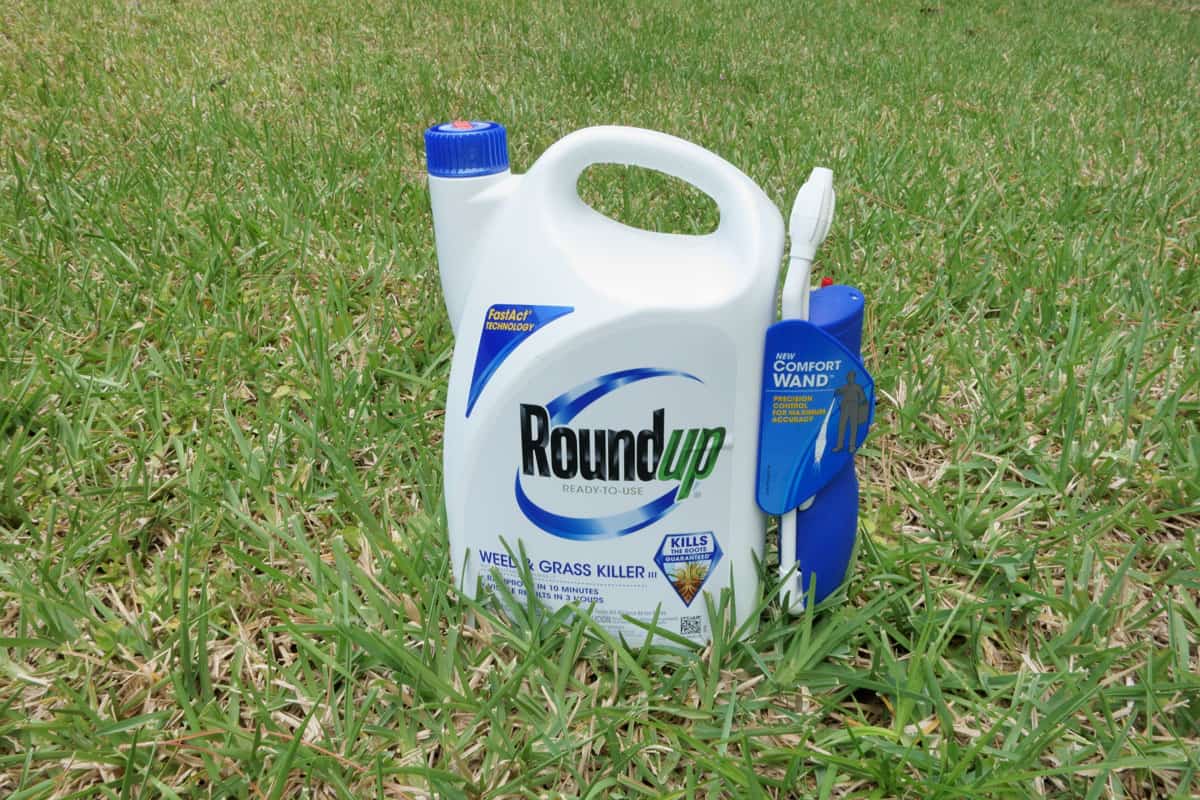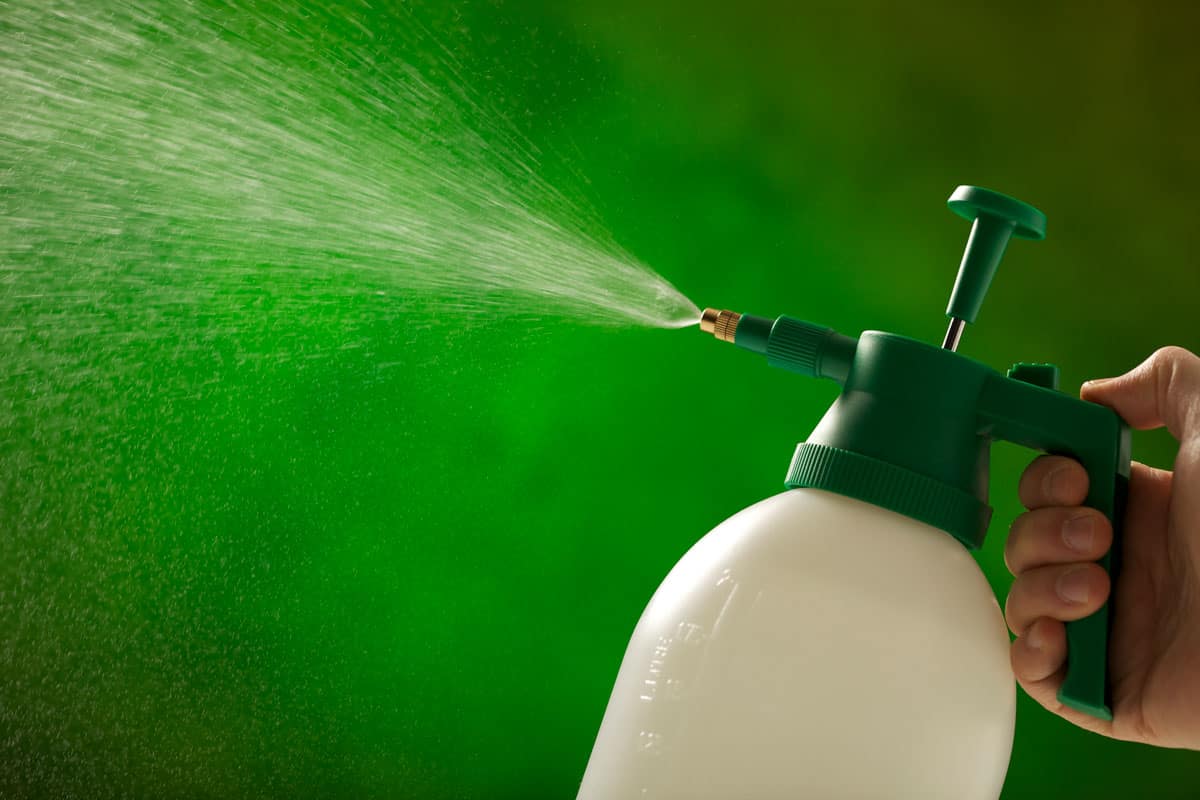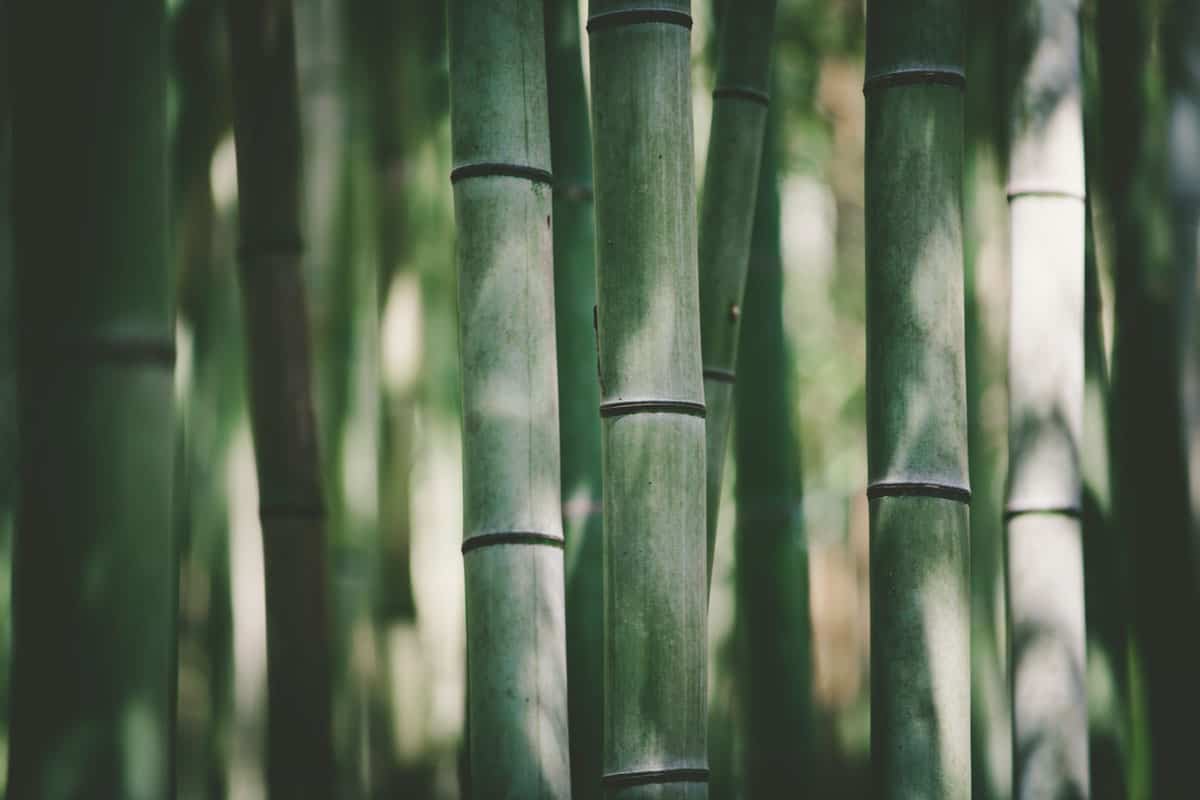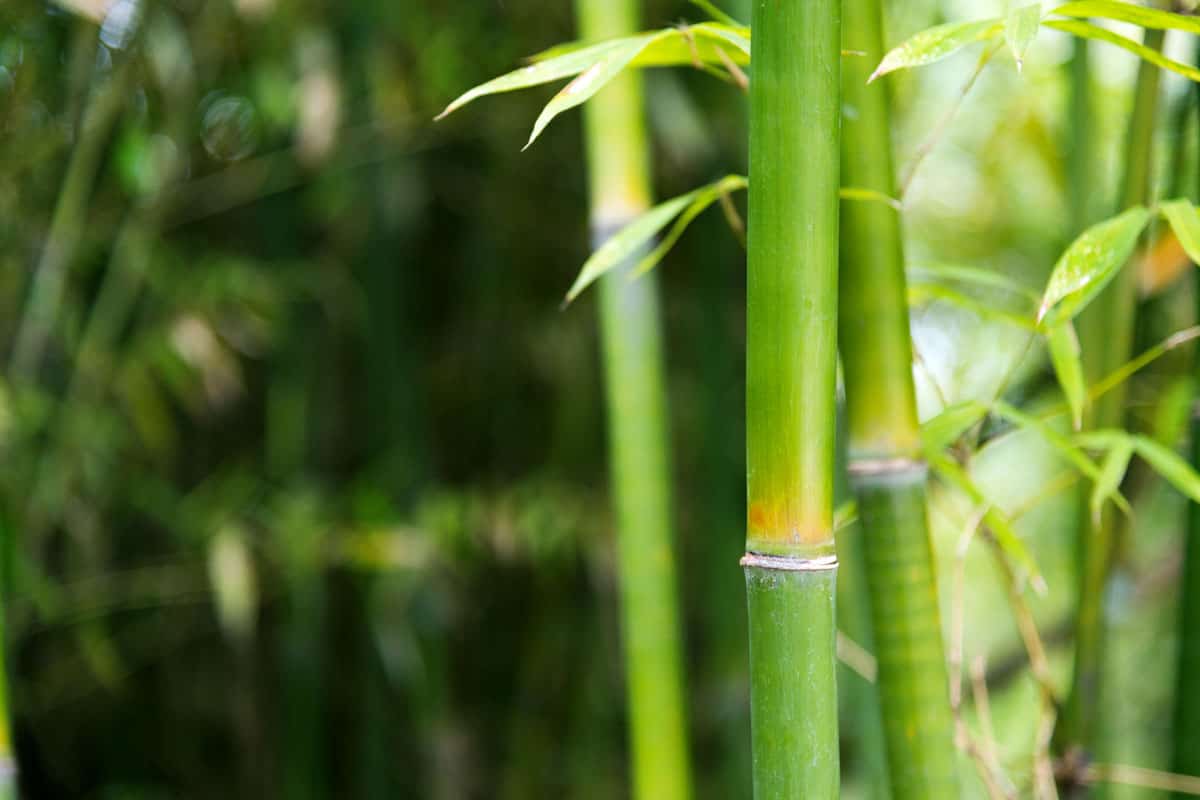Whether you have a pesky weed that keeps coming back or a plant that needs controlling: you likely have thought to use Roundup. However, does Roundup effectively work to kill bamboo? What about the rhizomes and roots of your plant?
Well, we've extensively researched these questions and have the answers below!
If bamboo grows rampant throughout your garden, you can usually control it using Roundup. One of the main ingredients in Roundup is glyphosate, which targets the growth enzyme in many species.
However, you will need to use high amounts of glyphosate and imazapyr (Arsenal) to keep bamboo from spreading and growing. So, it can take patience, plenty of product, and swift action to control bamboo in your landscape.
As we start this article, we will cover all things bamboo and discuss whether or not you can use Roundup to kill it. If you're new to tropical plants, have persistent bamboo, or need other advice, we're here to help. With that said, let's dive right into this topic!
![Closeup of green bamboo trees fresh healthy green, Will Roundup Kill Bamboo? [Inc. Rhizomes & Roots]](https://gardentabs.com/wp-content/uploads/2022/11/Will-Roundup-Kill-Bamboo-Inc.-Rhizomes-Roots.png)
Does Roundup Kill Bamboo?
Although it can, Roundup won't usually be strong enough to kill bamboo entirely. As we mentioned, the active ingredient 'glyphosate' works to inhibit your plant's growth enzymes, but this isn't always enough.
Bamboo tends to be extremely persistent in a landscape, often shooting up from the ground overnight. Therefore, spraying your entire plant(s) with the weed killer can be a waste.
According to the University of Florida, you can control bamboo by mixing a product like Roundup with high volumes of imazapyr (Arsenal and others).
Of course, you will need to use the two ingredients in conjunction to see any results, so this isn't as easy as getting rid of dandelions or another common grass-weed.
Another way to ensure your bamboo dies after applying Roundup is to cut each shoot to the ground before spraying. Doing this allows the Roundup to penetrate each bamboo shoot, often increasing its success rate.
Which Roundup Is Best For Bamboo?
Regarding which Roundup product is best for bamboo: you want to use their highly concentrated formulas for this plant species. Generally, the Roundup QuickPro line has one of the more concentrated plant-killing formulas, making it good for bamboo.
Roundup Pro Vantage is another line from the brand that experts recommend for high-potency killing, so those are two great options to consider.
With that said, you will need to also find a product with imazapyr as a 1% solution to use alongside your Roundup. Remember, this plant is very resilient and persistent, so it takes a couple of products.
On top of that, you'll likely need to reapply Roundup to the base of your bamboo multiple times before it entirely kills it. We recommend cutting the bamboo shoots down to the soil and then using an herbicide.
According to Clemson University, you might also find success using a non-selective herbicide with the active ingredient glyphosate for bamboo control, so that's something to remember.

Roundup QuickPro
This product can be applied to any plant you do not want, contains Glyphosate 73.3%, Diquat 2.9%, has a mix rate of 1.5 ounces per gallon of water, is fast-acting, and comes in a 6.8-pound container.
Follow this link to see it on Amazon.
How Do I Get Rid Of Bamboo Permanently?
If you want to get rid of your bamboo permanently, there are plenty of ideas to try. As we said, you will need to find a product with a higher percentage of glyphosate mixed with a bit of Arsenal.
You will typically find these ingredients (glyphosate) in common grass killers like Roundup. Moreover, you need to apply these chemicals at the beginning of a bamboo plant's life to see the best results.
For example, if you notice a new bamboo shoot sprout from the soil: spray it with Roundup.
Ensuring your product has time, and ample coverage will benefit its efficiency and control/kill the bamboo faster. Generally, bamboo will grow in clumps.
Therefore, you can target these growth clumps with a glyphosate-based weed killer, and you should see that the ground area becomes bamboo-free rather quickly.
On top of that, we recommend cutting down bamboo shoots to the soil, so the chemicals you spray can seep into their roots and base much better/faster.
Will Roundup Kill Bamboo Rhizomes?
For those who want to target bamboo from its origin, you might consider applying Roundup to your plant's rhizome. Although this can be somewhat effective, the best way to kill a bamboo's rhizome is to remove it from the ground manually.
Many experts and studies have found that the rhizomes of bamboo are virtually immune to herbicides. Therefore, spraying Roundup on them can waste product and time.
When you locate the rhizome of your bamboo plant, you want to try and pull out as many roots around it as possible. Think of the rhizome as a "clump" of roots from your bamboo shoots.
Even if you cut a bamboo shoot down to its base, there's still a chance the rhizome will come back with new growth and new bamboo plants.
This is because the rhizome of bamboo is its epicenter, so new growth will come from that area.
Does Roundup Kill Bamboo Roots?

Yes, using enough Roundup to kill and prevent bamboo roots from growing is possible. Although this can take time and a lot of product, spraying Roundup on exposed or shallow bamboo roots effectively kills them.
Remember, the active ingredient in Roundup products is glyphosate. This chemical essentially targets your bamboo/weed from a cellular level, preventing it from growing.
With enough concentrated formula, glyphosate can begin targeting the essential enzymes your bamboo roots need to grow and properly function.
With that said, many experts also recommend manually removing/pulling bamboo roots from the soil. Sometimes, nothing beats physically killing the roots, mainly when referring to bamboo.
As we said above, the rhizome of bamboo is essentially a clump of shoots and roots: so why not locate and remove the entire thing from the soil?
How Long Does Roundup Take To Kill Bamboo?
Once you cut your bamboo down to the ground and apply Roundup, the killing should begin almost immediately. However, according to Roundup, you can typically expect your product to work within 7–14 days.
During those 1-2 weeks on your bamboo, the Roundup will slow and prevent further bamboo growth. Additionally, your plants should become brown and start to wither away, which means the glyphosate is working and doing its job.
On top of that, Roundup's website also offers some advice for speeding up this killing process. According to them, you want to cut larger bamboo shoots down to below the stem joints.
Ideally, this will leave a hollow reservoir where you can directly pour or spray your product. From there, pour one tablespoon of undiluted Roundup® Weed & Grass Killer Super Concentrate into the open reservoir.
This should increase the potency and effectiveness of your Roundup.
What Time Of Year Should I Apply Roundup To Bamboo?
When it comes to the best time of year to use Roundup on bamboo/weeds, this typically falls in the spring and summer seasons. One thing about herbicides is that you need to use them while the target plant is actively growing.
A common mistake that gardeners make with Roundup is trying to apply it to bamboo during the downtime of their plants.
Considering bamboo often grows in tropical landscapes, this is a situation where you might have success using herbicide, even if it's fall or winter.
However, to get the most from your Roundup, the weather should be between 45 and 90 degrees, which isn't always the case depending on the month/season in certain regions.
So, we recommend waiting until early-mid spring, cutting your bamboo below the stem joints, and then continuing using Roundup through the summertime.
Is Bamboo Considered A Weed?
Although you might not consider bamboo a technical "weed," some species fall into this category. For example, invasive bamboo species, like Golden Bamboo, are invasive in the United States, thus gaining them a weed title.
The Chinese-native plant makes its way into various landscapes and regions throughout the US, often becoming a major issue for gardeners and homeowners.
Therefore, you want to treat more aggressive and invasive bamboo as a weed. Many weed killers list bamboo as a target plant for application, so this species isn't always desired.
Again, that doesn't mean all types of bamboo are bad, but they can multiply and take over space rather quickly.
Where Does Bamboo Typically Grow?

Most times, you will find bamboo growing throughout Asia and South America. However, bamboo species are prevalent throughout the southern regions of North America, especially in tropical places like Florida.
It's also worth noting that bamboo can be found growing in Australia and Africa, so you can find it almost anywhere warm and wet.
According to BambooGrove, you can often find bamboo anywhere that qualifies as tropical, sub-tropical, or temperate zones. So, if you can wear a swimsuit for most of the year where you live, there's likely bamboo growing nearby.
To Wrap Things Up

Whether you have bamboo growing throughout your garden or notice it clustering in one section, it's essential to control it. We found that Roundup can help control and kill bamboo, but you'll need to use it often and combine it with other Arsenal-based products.
Generally, bamboo grows in clusters, so we recommend cutting any shoots you see down to the ground. Next, you want to pour or spray Roundup into your hollow bamboo reservoirs, increasing its potency.
Give your chemicals about 1-2 weeks to kill the bamboo. Also, remember to keep an eye on rhizomes and roots; you might even want to pull them from the soil manually!
Made it this far? Check out these helpful related garden articles below:
Will Bamboo Grow In North Facing Gardens?

